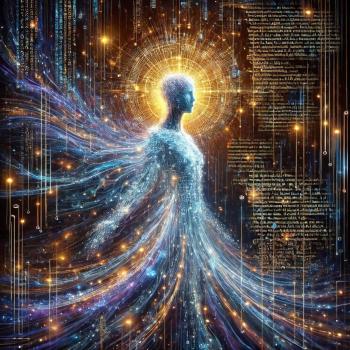I’m delighted to be a participant in the Patheos Book Club about John Walton’s latest book, The Lost World of Adam and Eve: Genesis 2-3 and the Human Origins Debate. If the title sounds familiar, it is because Walton has also written books with the titles The Lost World of Genesis One: Ancient Cosmology and the Origins Debate
(which I blogged through in detail back in 2009) and The Lost World of Scripture: Ancient Literary Culture and Biblical Authority
. And so one can definitely view this book as a sequel, or at the very least, a continuation of the same approach, now applying to Genesis 2-3 the principles he previously brought to bear on Genesis 1.
Walton is seeking to defend the inerrancy of the Bible by finding a way to understand the Bible not to be wrong when it reflects ancient understandings that we can no longer accept. I myself tried that for a while, and decided that it was better to let the Bible define its own character rather than imposing an ill-fitting framework upon it. But having said that, Walton’s far more honest inerrancy is certainly far better than one which seeks to preserve inerrancy by bending over backwards either to harmonize the Bible with modern science, or worse still, by denying the legitimacy of modern science.
Walton’s book mediates Biblical scholarship to a general readership. While some of it will still, I imagine, be challenging to those without a background in Biblical studies, the book is full of helpful analogies – such as when he uses the example of traffic reports in the Chicago area, and how, on the one hand, references to “the cave” and “the slip” will be confusing to non-locals, while a lengthy explanation each time would make traffic reports intolerably dull to locals (p.16). In the same way, any literature may be open to being misunderstood, or not understood at all, without its context of assumed knowledge between author and readers.
Walton acknowledges that the Bible uses language that reflects a viewpoint invalidated by modern science, such as when it makes the heart and intestines the locus of thoughts and feelings, or refers to the “water above” (pp.18-19). He also notes that the Biblical authors left us no dictionary (p.28), again requiring that we gain an understanding of ancient language and literature as best we can in order to comprehend and interpret what they wrote.
As he did previously with Genesis 1, here Walton suggests that Genesis 2-3 are focused not on material origins, but on functions and roles. Or, as he puts it in this book, it is a “home story” and not a “house story” (p.45), telling not about the materials and construction of the cosmos, but how it became a home to humans and to God.
In the process, Walton makes a number of very interesting interpretative suggestions. For instance, he suggests that when God causes a deep sleep to fall on Adam before the creation of Eve, it is not anaesthesia to prepare him for surgery, but a trance-like state to prepare him for a vision of being split in half, which in turn leads to Adam understanding that Eve is his “ontological equal” (pp.80-81, 109-110). As in earlier volumes, Walton discusses other Ancient Near Eastern literature, noting both similarities to and differences from the Biblical tales.
Walton is also concerned here with the role that Adam and Eve play in the New Testament, as it is that which more than anything else causes some modern conservative Christians to reject the conclusions of the biological sciences. He brings N. T. Wright in as a guest to write chapter 19. But he also discusses key texts himself, and has interesting suggestions, such as that Acts 17:26, which speaks of the origin of nations, has Noah rather than Adam in mind (pp.186-7).
Walton concludes by discussing some of the practical and pastoral reasons the issues he discusses are important. Among them, he notes that many Christians, when told that there is a choice to be made between the claims of the sciences and the claims of the Bible, lose their faith when the evidence for the former is presented persuasively (p.209).
The main place where I disagree with Walton’s views is when he suggests that the genealogies in the Bible, and the Fall itself, provide justification for believing that there must have been a historical Adam and Eve (pp.101-103). To me, the genealogies in the Bible show enough signs of being interested in things other than genealogical descent, that one need feel no compulsion to treat them as what modern genealogies provide. And once that cord is cut, the role of Adam as paradigmatic human can be brought to the fore, as a story not about a historical ancestor, but about everyone.
But for those who cannot draw such conclusions, Walton’s book provides a thoughtful biblical way of embracing the conclusions of modern science. Walton speaks at one point of God choosing “one pair from the rest of early hominids for a special, strange, demanding vocation” (p.177). He had previously made the case that Genesis 1 and 2 be understood sequentially, and thus Adam and Eve being two members of an already existing humanity – something that is also indicated in the story of Cain going away and yet fearing for his life and then building a city. And so he makes the case that Evangelicals need not and should not reject the scientific account of evolution on the basis of what the Bible says, but should allow that account to be evaluated in the only appropriate way, i.e. in terms of its account of the evidence, scientifically considered.
While Walton is writing mainly to persuade others with a high view of Scripture to stop waging war on science in a way that harms Christianity more than science, his discussion of the Bible and other ancient texts will be of interest even to those who do not share his tradition and thus also his pastoral concerns. And so The Lost World of Adam and Eve will be of interest to anyone interested in the Genesis stories in their ancient context, as a presentation of the fruit of detailed scholarship in a manner accessible to a general audience. And so I recommend the book, and hope that its contents get the discussion they deserve.













